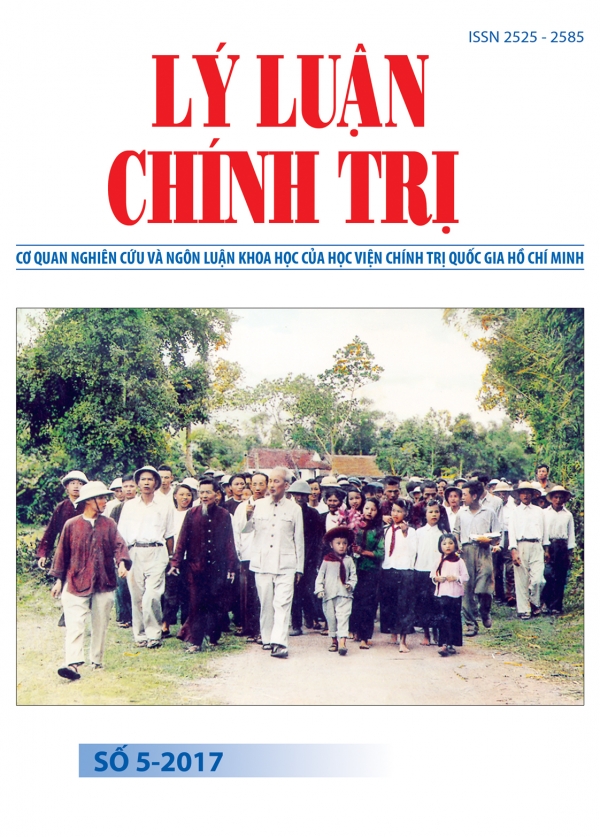Political Theory Journal (Vietnamese Version) Issue No 5-2017
CONTENTS - ISSUE No 5-2017
THEORY RESEARCH
3. NGUYEN XUAN THANG: Innovate and promote the quality of teaching and learning political theory to boost the capability of officers
10. PHAM NGOC ANH - HA TIEN LINH: Characteristics of Ho Chi Minh’s expression style
15. NGUYEN THE THANG: Revolutionary ethics mentioned in Correction of working style and the current work of building cadres and party members
21. TRAN THI MINH TUYET: From Ho Chi Minh’s views of honesty, uprightness to building the government of integrity
27. HO TAN SANG: “New life” and implications for building political culture in Vietnam today
32. LY VIET QUANG: Ho Chi Minh’s thought of win-win cooperation among countries
37. NGUYEN XUAN TRUNG: The life philosophy in Ho Chi Minh’s thought of religious tolerance
42. NGUYEN VAN DUONG: Theoretical and practical values of Correction ofworking style
FIGURES AND EVENTS
47. NGUYEN VAN CONG: Safe zone in Dinh Hoa, Thai Nguyen: The venue where President Ho Chi Minh wrote Correction of working style
51. DO HOANG LINH: President Ho Chi Minh and the early days of his return to the Safe zone
PRACTICE
55. LE NGOC HUNG - NGUYEN NGOC ANH: Social security policies in Vietnam: Realities and rising issues
63. HO THANH THUY: Vietnamese agricultural products and solutions to join global value chains
69. NGUYEN HONG NHUNG: Vocational training for rural laborers: Realities and solutions
73. NGUYEN THI MIEN: Evaluation criteria of sustainable agricultural development in lowland coastal provinces
FORUM
79. NGUYEN VIET THAO: The fourth industrial revolution
85. NGUYEN DINH TAN: Documents of the 12th Party Congress and its application to lecturing of social structure and social stratification
90. NGUYEN AN NINH: “Prosperous people” - The highlighted characteristic of socialism in Vietnam
95. BUI DINH BON: The sabotage of hostile forces in political sphere
102. NGUYEN LUONG NGOC - PHAN THI THU HANG: Enhance the sense of citizenship to build and complete the socialist law-ruled State
107. BUI VO: Drug court and the applicability in Vietnam
INTERNATIONAL ISSUES
113. LE VAN TOAN: Vietnam - China relations in new contexts
119. DINH THI HUONG GIANG: Managing conflict of interest in public affairs:
International experiences
125. SUMMARY OF MAIN ARTICLES
SUMMARY OF MAIN ARTICLES
Tran Thi Minh Tuyet: From Ho Chi Minh’s views of Honesty, Uprightness to building the government of integrity
President Ho Chi Minh required public officers to be honest; a revolutionist should be diligent, thrifty, and honest, however, he cannot be fully revolutionary without being upright. Due to requirements of current national contexts and thanks to the understanding of Ho Chi Minh’s ethical heritage, Vietnam Government is striving to become the Government of integrity. That target could be reached when every member of the public authority has the sense of “self-correction” to be honest and upright in light of Ho Chi Minh’s thought.
Nguyen Xuan Trung: The life philosophy in Ho Chi Minh’s thought of religious tolerance
With his independent and creative thinking, Ho Chi Minh inherited Vietnamese tradition of religious tolerance, developed and elevated it with the sense of humane communist, which based on the profound life philosophy: religious is the issue of human and for human. The life philosophy can be found in the fundamentals of Ho Chi Minh’s thought of religious tolerance. It is the life philosophy that created the profound humane values in Ho Chi Minh thought, particularly in the thought of religious tolerance.
Le Ngoc Hung, Nguyen Ngoc Anh: Social security policies in Vietnam: Realities and rising issues
Theories and realities have shown that social security policies are the target and motivation of inclusive and sustainable development, thus economic policies must be attached to social security ones. Vietnamese model of social security policies includes four pillars: labor and employment; poverty reduction; social insurance; social aids and basic social services. However, rising issues include: unprogressive social security takes a small proportion in people’s incomes. Besides, social security policies have yet to fully cover human life cycle and target groups. Thus, it is essential to continue researching and building criteria of social security and solutions to inclusive and sustainable development.
Ho Thanh Thuy: Vietnamese agricultural products and solutions to join global value chains
Agricultural products have found its position in some large-scale world markets and become main exports of Vietnam. However, raw products are main forms of exports, while processing, packaging, branding and marketing in overseas markets are not taken care of. Vietnamese agricultural products stay low in the value chains, with merely basic operations and procedures like producing and preliminary treatment and lack of higher-value stages like processing and marketing. The weakness has greatly impacted on the interests of producers, enterprises and the nation. That is why deeply participating in the global value chains is critical to the development of Vietnamese agricultural products.
Nguyen Thi Mien: Evaluation criteria of sustainable agricultural development in lowland coastal provinces
In the contexts of economic integration and climate change, sustainable agricultural development is the current affair and the inevitable trend in the development process of each locality. The questions are connotation and criteria of sustainable agricultural development. To clarify the issues, the study forms the contents and evaluation criteria of sustainable agricultural development in provinces.
Nguyen An Ninh: “Prosperous people” - The highlighted characteristic of socialism in Vietnam
People’s prosperity is the highlighted factor of the first characteristic of socialism in Vietnam. The factor has been affirmed in the 2011 “Platform of national construction in transitional period to socialism”. This theoretical achievement and its application to the national renewal require prolonged developmental process. The article analyzes basic connotations, conditional factors and the Party’s clearer affirmation of the people’s prosperity.
Journal Archives
Journal Archives
Media
Photo Gallery
Contact us






